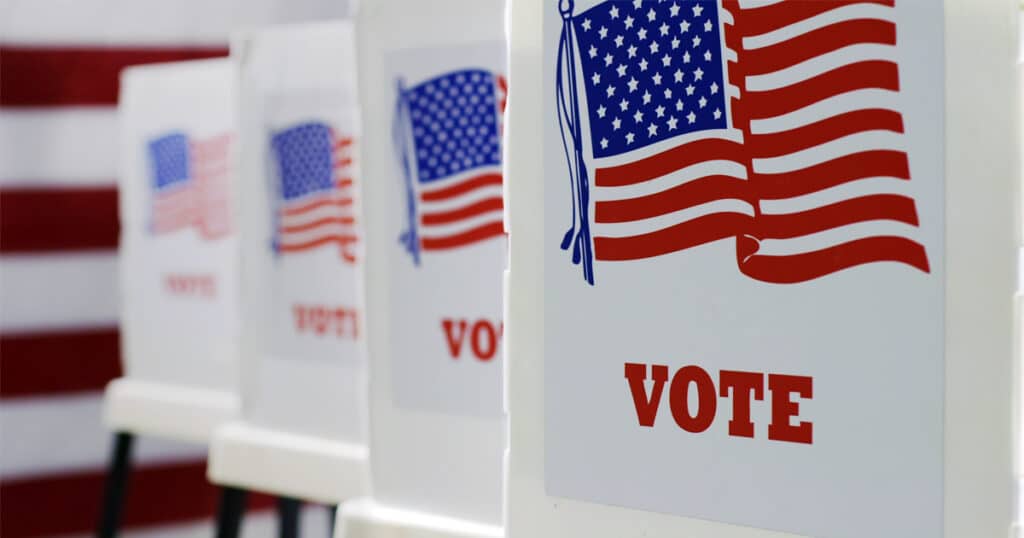
Election Integrity Notches Major Wins in 2024
In a presidential election year like 2024, it’s natural that the concerns of voters and state legislators should turn to the security of their elections. And turn they did.
Where legislators and voters set to work on elections, they generally improved the integrity of the procedures we use to choose our representatives.
Since 2021, The Heritage Foundation has been tracking the laws of every state (and the District of Columbia) governing the conduct of elections—local, state, and federal—and ranking them in its Election Integrity Scorecard: 2024 saw 11 states improve their total election-integrity scores: Arkansas, Connecticut, Idaho, Indiana, Kentucky, Louisiana, Nevada, New Hampshire, Ohio, West Virginia, and Wisconsin.
Meanwhile, only two states, Arizona and Nebraska, and the District of Columbia saw their scores decline.
Among the year’s more interesting changes are those from Nevada, one of which resulted in immediate gains while others hold great promise for the future if ultimately enacted.
Nevada—among the worst performing states since the scorecard was released—gained one point this past November, when 53% of its voters defeated a referendum that would have made ranked choice voting the norm in the state.
Ranked choice voting is an opaque and error-prone process, one that multiplies the challenges for election administrators far more than it delivers on its illusory promise of fairer outcomes.
Additionally, 73% of Nevada voters resoundingly endorsed two new measures that would require voters to present a photo ID to vote in person and to provide a unique identifying number such as that found on a driver’s license or Social Security card if voting by mail. To become state law, however, Nevada voters must confirm their support for these voter-ID measures in the next referendum, scheduled for 2026.
In one sense, Nevadans’ responses to these referendums were unsurprising. At those same polls, 50.6% of Nevadans gave the state’s six electoral votes to Donald Trump, who campaigned on the issue of secure elections. But in another sense, the matter is hardly clear-cut. Nevada’s U.S. Senate race was decided for the Democratic candidate as were three of the state’s four U.S. House races, indicating that basic election security is a concern cutting across party lines, which would be a positive development in and of itself.
While the state continues to lag its peers in several important areas, these improvements are nonetheless notable.
Elsewhere, states that were already strong on election integrity continued their improving ways in 2024. Arkansas concluded agreements with three other states to share voter info in a manner that will help prevent duplicative, cross-state registrations of voters.
The state also pledged to report annually to its legislature on improvements to the accuracy of the state’s voter rolls. Those earned Arkansas two points.
Indiana enacted a law, HB 1264, enabling election officials to use commercial data from credit agencies to verify voter registrations and jury information to verify citizenship status of would-be voters.
Ohio did its part by requiring election officials to use the federal Systematic Alien Verification for Entitlements (SAVE) Program and state jury information to confirm the citizenship status of registered voters.
Meanwhile, Wisconsin voters endorsed an amendment to the state constitution prohibiting any private funding of election administration and earning the state a net 2-point rating improvement for the year.
Fights over ranked choice voting occurred outside of Nevada with a variety of outcomes. Missouri voters banned the practice outright, D.C. voters adopted it, and Alaska voters failed to repeal it.
Bills concerning noncitizen voting were a favorite of state legislatures this year. At least 11 states enacted legislation or amended their constitutions to prevent noncitizen voting.
It’s a little disconcerting that these measures are even necessary. One would think it self-evident that only citizens should be allowed to vote in our elections. After all, if no distinction is made between a citizen and a foreigner for purposes of political action, then nationhood itself is in serious jeopardy.
Regrettably, two states (and the District of Columbia) had net declines in their overall election-integrity scores.
The District lost a point when it adopted ranked choice voting through a November ballot referendum. Nebraska lost a point when it allowed same-day voter registration for persons naturalized as citizens after the voter registration deadline. And Arizona netted a 1-point decrease when it permitted the acceptance of certain mail-in ballots with a signature but no ID.
The changes in 2024 produced few shifts in the overall rankings. Tennessee remains atop the list with 90 points out of 100. Arkansas enjoyed the most notable rise from seventh place to a tie for fifth place with Oklahoma at 82 points. Hawaii remains in the basement with 27 points.
This year will not feature electoral fireworks. Only New Jersey and Virginia will elect governors. Still, it would be a mistake for legislatures to let their interest in elections wane. Elections run better when they are prepared for well in advance.
Hopefully, legislators will take the opportunity to enact positive reforms, such as those outlined in the “Model Legislation” section of The Heritage Foundation’s Election Integrity Scorecard, in the months to come.



